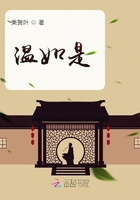Then she fell on her face on the ground,her forehead striking the floor with the sound of stone upon stone.The three women thought her dead;but a moment afterward she stirred,and they saw her drag herself on her hands and knees to the corner where the little shoe lay.At this they dared look no longer;they saw her not,but they heard the sound of a tempest of sighs and kisses,mingled with heart-rending cries and dull blows as of a head being struck against a wall;then,after one of these blows,so violent that they all three recoiled in horror,deep silence.
'Can she have killed herself?'asked Gervaise,venturing her head through the bars.'Sister!Sister Gudule!'
'Sister Gudule!'echoed Oudarde.
'Alas,she does not move!'cried Gervaise;'can she be dead?Gudule!Gudule!'
Mahiette,whom deep emotion had rendered speechless,now made an effort.'Wait a moment,'said she;then going close to the window—'Paquette!'she cried—'Paquette la Chantefleurie!'
A child blowing unsuspiciously on the half-lighted match of a petard,causing it suddenly to explode in his face,would not be more appalled than Mahiette at the effect of this name,thus unexpectedly launched into Sister Gudule's cell.
The recluse shook in every limb,then,rising to her feet,she sprang at the loophole with eyes so blazing that the three women and the child all fell back to the very edge of the quay.
Meanwhile the terrible face of the recluse remained close to the grating.'Oh!oh!'she cried,with a horrible laugh,'it is the Egyptian woman calling me!'
At that moment a scene which was taking place on the pillory caught her haggard eye.Her brow contracted with horror,she stretched her two skeleton arms through the cross-bars,and cried in a voice like the rattle in a dying throat,''Tis thou again,daughter of Egypt!'Tis thou calling me,stealer of children!Accursed be thou forever—accursed!accursed!accursed!'
Chapter 4-A Tear for a Drop of Water
The concluding words of the foregoing chapter may be described as the point of junction of two scenes which,till that moment,had been running parallel,each on its own particular stage;the one—which we have just been following—at the Rat-Hole;the other—now to be described—on the pillory.The former had been witnessed only by the three women with whom the reader has just been made acquainted;the latter had for audience the whole crowd which we saw gathering in the Place de Grève round the pillory and the gibbet.
This crowd,in whom the sight of the four sergeants stationed since nine in the morning at the four corners of the pillory had roused the pleasing expectation of a penal exhibition of some sort—not,perhaps,a hanging,but a flogging,a cutting off of ears or the like—this crowd had increased so rapidly that the four mounted men,finding themselves too closely pressed,had more than once been under the necessity of'tightening'it,as they called it then,by great lashes of their whips and their horses'heels.
The populace,well accustomed to waiting for public executions,manifested but little impatience.They amused themselves by looking at the pillory,a very ****** structure,consisting of a hollow cube of masonry some ten feet in height.A steep flight of steps of unhewn stone—called par excellence the ladder—led to the top platform,on which lay horizontally a wheel of stout oak.To this wheel the victim was bound kneeling and with his hands pinioned behind him;a shaft of timber,set in motion by a windlass concealed in the interior of the structure,caused the wheel to rotate horizontally,thus presenting the face of the culprit to every point of the Place in succession.This was called'turning'the criminal.
It will be seen from the deion that the pillory of the Grève was far from possessing the many attractions of that at the Halles.Here was nothing architectural,nothing monumental—no roof embellished with an iron cross,no octagon lantern tower,no slender pilasters blossoming out against the edge of the roof into acanthus-leafed and flowery capitals,no fantastic,dragon-headed gargoyles,no carved wood-work,no delicate sculpture cut deeply into the stone.
One had to be content with the four rough-hewn sides of stone and an ugly stone gibbet,mean and bare,at the side of it.The show would have been a poor one to the ******* of Gothic architecture,but truly nobody could be more indifferent in the matter of architecture than the good burghers of the Middle Ages;they cared not a jot for the beauty of a pillory.
At last the culprit arrived,tied to a cart's tail,and as soon as he was hoisted on to the platform and,bound with cords and straps to the wheel,was plainly visible from every point of the Place,a prodigious hooting mingled with laughter and acclamations burst from the assembled crowd.They had recognised Quasimodo.
It was indeed he.Strange turn of fortune's wheel!—to be pilloried on the same spot on which,but the day before,he had been saluted,acclaimed Pope and Prince of Fools,and counted in his train the Duke of Egypt,the King of Tunis,and the Emperor of Galilee.One thing,however,is certain,there was no mind in that crowd,not even his own,though in turn the victor and the vanquished,that thought of drawing this parallel.Gringoire and his philosophy were lacking at this spectacle.
Presently Michel Noiret,appointed trumpeter to our lord the King,after imposing silence on the people,made proclamation of the sentence,pursuant to the ordinance and command of the Lord Provost.He then fell back behind the cart with his men.















